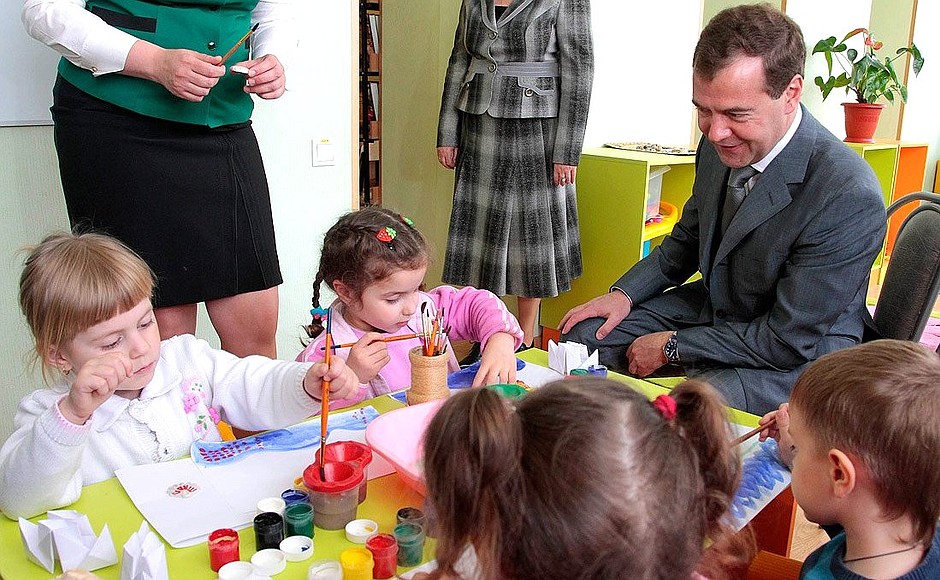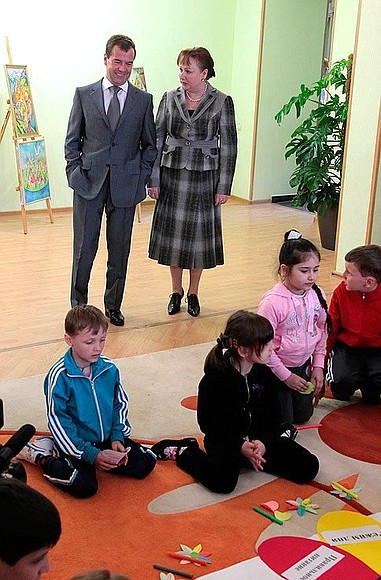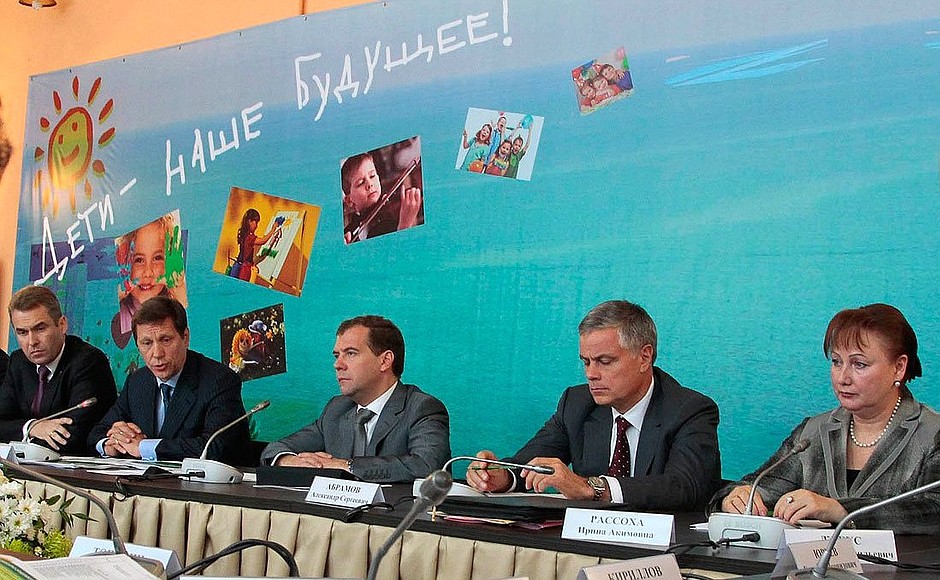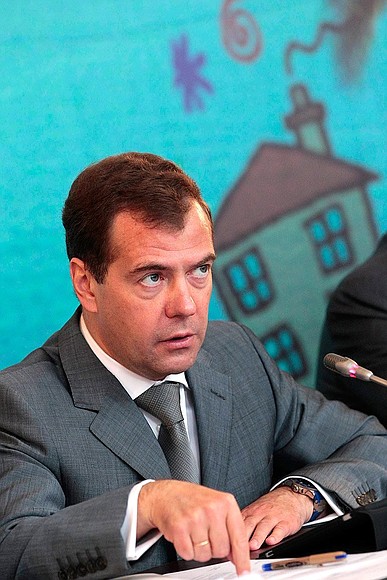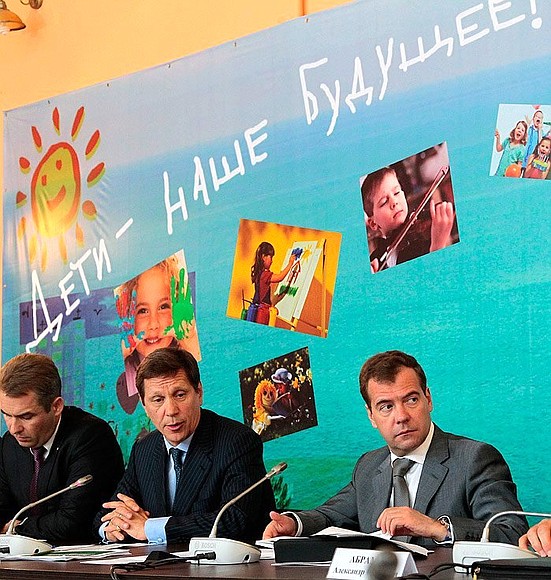Dmitry Medvedev pointed to the need for strict regulations enforcement regarding the organisation of summer holidays and treatment for children, stressing that any violation of the relevant standards should entail liability.
Before the meeting which was held at the Nikolai Semashko children's therapeutic facility, the President inspected the facility and talked with its staff and the children receiving treatment there.
The Nikolai Semashko Dermatological Therapeutic Facility was founded in 1970 and its profile is treatment of skin diseases, as well as the digestive, nervous and musculoskeletal systems. The facility annually treats more than 3,000 children aged 7 to 14.
* * *
President of Russia Dmitry Medvedev: Good afternoon, colleagues,
This is a workday for us and I would like to come back to a subject we have been addressing at length last year: school holidays and children’s health resorts.
Summer holidays are just around the corner and this year about 70,000 health camps will open in our country. Last year 8.6 million children received treatment and spent their holidays at such camps. This is a major challenge: we must do everything necessary to ensure that these camps are in good condition, that they have everything they need and provide the best possible conditions for recreation.
Last autumn, we summed up the previous summer season and analysed the main shortcomings and positive experience, which was hopefully also gained. I issued instructions to remedy a number of problems regarding the organisation of children's holidays, and since the deadlines for their execution have passed, I expect the relevant ministers to report on their efforts and the preparations for the upcoming holiday season.
“Summer holidays are just around the corner so we must do everything necessary to ensure that children’s recreation camps have everything they need.”
Let me remind you also that from January 1, 2010 the responsibility for the organisation of children’s summer holidays and health treatment was transferred to the regional and municipal authorities. The aggregate expenditure on this totalled nearly 50 billion rubles last year, which is quite a lot of money.
Now, a few words about the key issues we must discuss today. First, we agreed to develop consolidated standards for all children's health camps. Of course, these must be the highest standards possible: the health standards and the rules for children’s transportation to the camp and home. In addition to creating a safe and comfortable environment for the children these standards must also be enforceable. Naturally, compliance must be monitored on a regular basis and violations of rules and procedures should entail liability. In this context, let me remind you of some sad statistics. The number of outbreaks of epidemic diseases increased in 2010 compared with 2009, and 186 children fell ill, while 16 children died in accidents.
I know that several regions of those represented here at this meeting have children's insurance. I believe that this positive experience should be extended to the rest of our country. In 2010, children’s insurance existed in only three Russian regions, but this year we intend to introduce it in 61 regions, or nearly two-thirds of our country. I think it is necessary to introduce it everywhere because it is a civilised system that can help us address many problems.
Another issue is the depreciation of the infrastructure at summer camps. All of us are familiar with this subject. Most camps were built in the period from the 1960s to the 1980s, during the Soviet era. Almost 25% of them need repairs, and I believe this figure is overoptimistic because we have a tendency to patch up problems and say, ‘Here, we have fixed it and everything is fine now.’ But in reality the figure is much higher. I want to understand how the work is proceeding and would like to hear from government members and the regional governors.
“A great deal depends on the teachers, their professional qualifications and their personal qualities. I instructed the Government to draft by the end of April a programme for the training of counsellors and other professionals employed at children's camps.”
Targeted programmes on children's holidays have been adopted and are being implemented in 38 regions. Ideally, each region should have a programme of its own because there are children everywhere. I believe that the regional governments, governors and other local authorities should be in charge of this effort. Moreover, these programmes should not be aimed at just patching up holes; they must create new recreation areas and ensure a full-fledged infrastructure upgrade and increase children’s safety. If such programmes are adopted but do not incorporate these tasks, they must be revised.
Last year, we repeatedly stated that it would be unacceptable to convert children’s holiday facilities. I issued instructions to take all necessary steps, within the bounds of the law of course, to prevent such actions. I also want to hear what has been done in this area.
Third. Summer holidays are an excellent opportunity for many people, and for some it may be the only opportunity, to recharge their batteries, while for children it is a chance to make friends and to learn something new. This is especially true of situations where children are caught in difficult circumstances, be it major perturbations our country has seen or personal health problems. A great deal depends on teachers, their professional qualifications and their personal qualities.
I instructed the Government to draft by the end of April a programme for the training of counsellors and other professionals employed at children's camps. We talked about this last year as well because, unfortunately, there are all kinds of teachers and counsellors, and some of them need additional training. It is also necessary to draft recommendations for recreation activities and for the improvement of educational work. I would like to hear a report on this topic.
Let's start the discussion.
<…>
